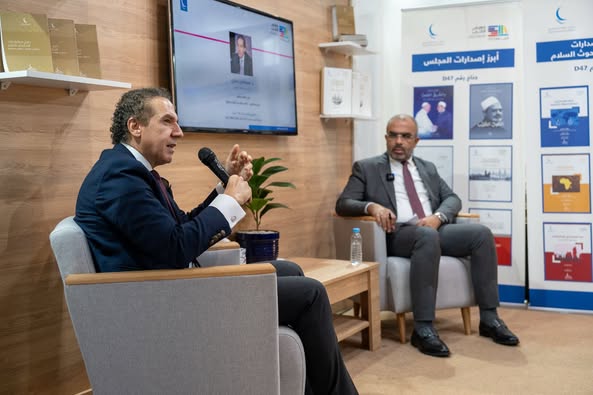“Environmental Protection is a Human Responsibility” — Seminar at the Muslim Council of Elders’ Pavilion at the Abu Dhabi International Book Fair
Sheikh Dr. Abdulaziz bin Ali bin Rashid Al Nuaimi: Sustainability embodies the vision of the United Arab Emirates and its wise leadership in preserving the planet and its natural resources
Sheikh Al Nuaimi praises the Muslim Council of Elders’ efforts in promoting the role of religions in environmental conservation
During a seminar held at the Muslim Council of Elders’ pavilion at the Abu Dhabi International Book Fair, Sheikh Dr. Abdulaziz bin Ali Al Nuaimi: Protecting nature begins with human beings recognizing their responsibility toward the Earth
As part of its cultural and intellectual program at the 34th Abu Dhabi International Book Fair, the Muslim Council of Elders organized a seminar titled “Environmental Protection is a Human Responsibility,” presented by Sheikh Dr. Abdulaziz bin Ali Al Nuaimi, Environmental Advisor to the Government of Ajman and fondly known around the world as “The Green Sheikh.”
At the beginning of the seminar, Sheikh Dr. Al Nuaimi affirmed that sustainability reflects the vision of the United Arab Emirates and its wise leadership in safeguarding the planet and its natural resources, aligning with the vision of the late Sheikh Zayed bin Sultan Al Nahyan — may Allah rest his soul — who famously said: “Give me agriculture, and I shall guarantee you civilization.”
Sheikh Dr. Abdulaziz Al Nuaimi emphasized that integrity is the foundation of sustainability, calling for the adoption of high human values such as honesty, integrity, and justice — values deeply rooted in Emirati society, which he described as a “rare diamond” in its leadership, people, and land. He also praised the efforts of the Muslim Council of Elders, chaired by His Eminence Prof. Dr. Ahmed Al-Tayeb, Grand Imam of Al-Azhar, in strengthening the role of religious leaders in addressing global challenges, foremost among them climate change. He also highlighted the Council’s organization of the Global Summit of Religious Leaders, which resulted in the issuance of “The Call of Conscience: The Abu Dhabi Joint Declaration on Climate,” as well as the historic establishment of the Faith Pavilion — the first of its kind — at COP28 and COP29.
The Green Sheikh further explained that true reading and responsible writing form the pillars of intellectual and cultural sustainability. He stated: “When you open a book, you open a window to a new world and plant seeds of wisdom in your heart. Every act of reading builds the self, and every act of writing is a legacy for future generations.” He urged the audience: “Be readers who build, writers who sow, and humans who cultivate and flourish.” He emphasized that book fairs serve as vibrant spaces for reading, writing, and nurturing minds, citing the Quranic verse: “Nūn. By the pen and what everyone writes!” [The Qur’an, 68:1] to illustrate the sacredness of the word and its role in the making of civilizations.
The Environmental Advisor to the Government of Ajman also called for reviving the lifeblood of rivers and rescuing endangered animals from the threat of extinction. He stressed that protecting nature begins with human awareness of responsibility toward the Earth, sharing his personal experiences, such as his visit to the kingdom of the rare gorillas in Rwanda, noting that these creatures offer a living lesson in behavior and harmony with nature.
It is worth mentioning that the Muslim Council of Elders’ pavilion at the 2025 Abu Dhabi International Book Fair is showcasing over 250 diverse intellectual and cultural publications, including several new releases from Al Hokama Publishing for 2025, addressing major contemporary intellectual and cultural issues. This is part of the Council’s broader vision and mission to promote peace, foster dialogue, and reinforce the values of tolerance and human coexistence. The Council’s pavilion is located at the Abu Dhabi National Exhibition Centre (ADNEC), Stand No. 10C35, Hall 10.










